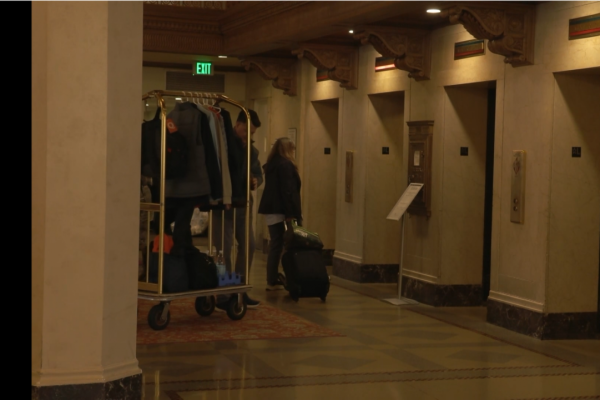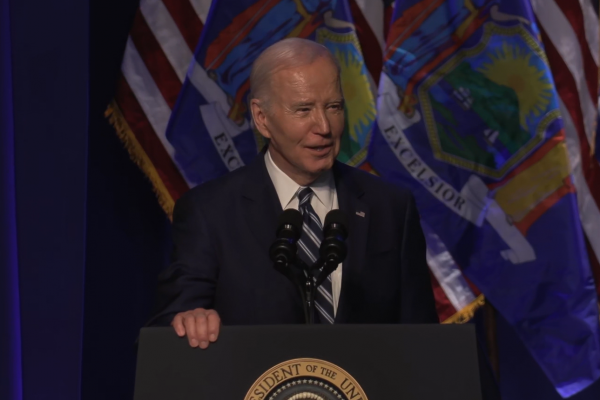Students Chattering NAT
(Greg Bradbury)
Students in Professor Roy Terry’s COM 101 Class at Syracuse University are waiting to go into their lecture to but once they go in the chatter from the students shifts.
Typing NAT
(Greg Bradbury)
As Professor Terry begins his lecture, most began furiously typing away everything he says. Laptops have become a must in college and since then students have begun to replace their notebooks with them. Laurent Rub (Rewb), a student in his class says it’s impossible to keep up without one.
Lauren Rub
“It’s much more helpful for me to use my computer rather than hand notes in Roy Terry’s class because he goes very fast and its easier for me to type rather than hand write what he says in his class.”
Typing NAT
(Greg Bradbury)
Laptops allow students to keep up in an organized manner that creates an easy place to find what they are looking for. Professor Elliot Lewis in the Newhouse School of Public Communications draws on his own experiences to see the benefits.
Professor Elliot Lewis
“I don’t think I could’ve gotten through law school if I didn’t have the ability to take notes on my laptop because by taking notes on my laptop you then create a searchable database.”
(Greg Bradbury)
Not only are they good at keeping track of notes, but they also allow students the ability to access all their coursework in one place. According to McGraw-Hill more than 60% of students prefer to enroll in a class that allows technology. Professor Kivanc (Kr-Unch) Avrenli (Av-Ren-Ly) in the Whitman School of Management says that it is the perfect match for students and professors.
(Professor Kivanc Avrenli)
“Thanks to using the blackboard platform our students don’t have to buy the textbook our students don’t have to buy any homework access codes because we create our own homework assignments we create our own homework assignments we create our own tests using blackboard so everything is online everything is prepared by us so whatever we cover.”
(Greg Bradbury)
It also can allow students multiple attempts on homework with automatic grading, giving them a chance to get better grades. The McGraw Hill study also says technology more than three-fourths of professors become more efficient with technology.
(Professor Kivanc Avrenli)
“And we can use our time to write better lectures to provide higher quality lectures for the students other than spending our time grading.”
(Greg Bradbury)
Almost every student owns a laptop and seemingly all professors incorporate it in the classroom one way or another. Classes are able to keep students engaged by following along with readings, powerpoints, and online quizzes. Everyone agrees there are lots of ways for students to use laptops during class – but not all of them… are good.
Text Ding NAT
Typing NAT
Message Sent NAT
(Greg Bradbury)
Laptops in lectures have given students the opportunity to surf the web, distracting those students from taking notes. Studies show if one student isn’t focusing it could cause other students to lose focus, too. This is forcing professors to use the technology for its benefits while avoiding the downsides.
(Professor Elliot Lewis)
“I think there are some appropriate uses for it, its just do the positives outweigh the negatives, is it a wash, and different professors come down on that differently.”
(Greg Bradbury)
Professor Lewis does not allow students to use social media in class.
(Professor Elliot Lewis)
“I do think it is something that has to be monitored, and if students are abusing that and working on during class then I reserve the right to bounce them out of class or ban them from using laptops in the future.”
(Greg Bradbury)
But he admits its hard to enforce while also keeping the class going.
(Professor Elliot Lewis)
“Sometimes you don’t want to stop the class every 10 15 minutes where you don’t want to stop the class to call a kid out.”
(Greg Bradbury)
While laptops have become normal in the classroom phones mostly stay out of sight. Professor Avrenli in the Whitman School of Management made says 95% of his students stay off their phones, but htere are times when he wants to engage – ALL _ of his class. So he began using an app called flipped. The app tracks students cell phone usage in class and those who avoid using their cell phone are rewarded with a grade at the end of the semester. So far, he says, the app has been successful.
(Professor Kivanc Avrenli)
“I do not have a single student who is constantly on his or her cell phone. I almost never see anyone on their phone. They are engaged.”
(Greg Bradbury)
Students admit to getting wrapped up in social media on their phone during class, and some, like Junior, Isha (Ee-sha) Battu (Ba-TOO), think this is a way to help them stay engaged.
(Isha Battu)
“If my phone lights up I’ll still wonder what’s happening like that’s not completely gone, but i do understand the importance of what he is trying to do.”
(Greg Bradbury)
Most college Professors incorporate technology into their classes one way or another because, as Elliot Lewis says, they are are essentially forced to.
(Professor Elliot Lewis)
“There is probably an argument to be made that says writing with a hammer and chisel back in the caveman days makes you remember things more than paper and pencil, but we have to change with the technology.”
(Greg Bradbury)
And most students like Madelyn Urabe (Your-ab-ay) – a student in Lewis’ class are glad professors see the writing on the wall.
(Madelyn Urabe)
“We’re in the age of technology so its almost foolish to kind of not acknowledge that technology that technology isn’t immersing into our lives more.”
(Greg Bradbury)
As technology becomes more prevalent, students are faced with the task of using it for class work when with just a couple of clicks they could be far away from the classroom. I’m Greg Bradbury
Clicking NAT





